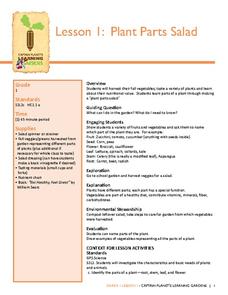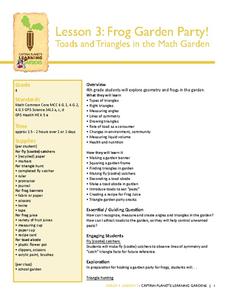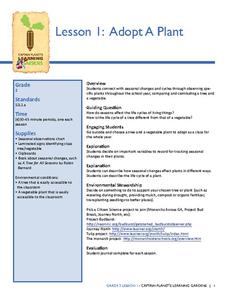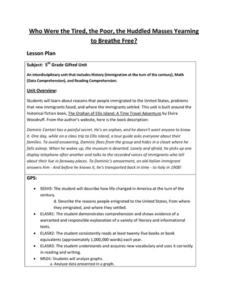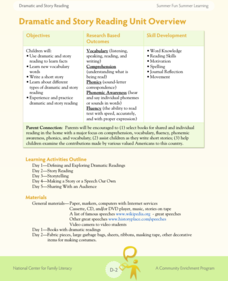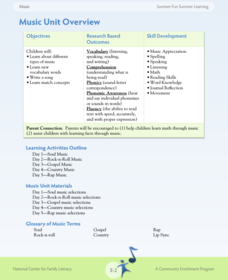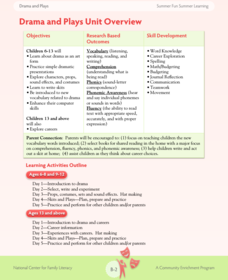GPS Teacher Resources
Find GPS lesson plans and worksheets
Showing 389 resources
Captain Planet Foundation
Plant Parts Salad
How are vegetables beneficial to a healthy diet? Have kids examine different types of vegetables, such as zucchini, broccoli, and carrots, and determine which parts of the plant they represent. Then, they taste the vegetables as a...
Captain Planet Foundation
Frog Garden Party! Toads and Triangles in the Math Garden
It's frog party time! With frog banners, frog juice, and a triangle hunt, your garden party is sure to be both entertaining and educational. The lesson connects geometry, earth science, and delicious snacks to teach kids about ecosystems...
Captain Planet Foundation
Sorting Out Soils
Sift through soil and learn about why it's important for organic processes. After discussing what makes up soil, such as the living organisms and what types of soil have more nutrients, kids sample layers of mulch and deeper soil to...
Curated OER
Getting it Straight with Latitude and Longitude Skills
Teachers can help students learn latitude and longitude skills using games and other motivating activities.
Curated OER
Mountains
An informative and well-designed presentation on mountains awaits your geographers. Excellent photographs from mountain ranges around the world are includedin this terrific PowerPoint. The last slide effectively sums up what pupils have...
Captain Planet Foundation
George Washington Carver and the Sweet Potato
Learn about George Washington Carver's important contributions to agriculture by studying the sweet potato. First graders read about the inventor's observations and prepare sweet potato slips for the class garden. Additionally, they...
Captain Planet Foundation
Worm Your Way Out of This
How can you provide healthy soil for your garden? Study worms, bacteria, and other microorganisms in a lesson about decomposition and organic compost. After discussing what you know about worms and watching a video, watch what worms do...
Captain Planet Foundation
Adopt-A-Plant
Note the way that plants change during the season by adopting a plant on your school campus. After your class chooses their plant, they research the plant's needs, how it differs from other plants, find ways to support their plant's...
Mission Valley Ambulance
The Crucible
Prepare readers of Arthur Miller's The Crucible for a timed, in-class essay assessment with seven graphic organizers that ask individuals to note conflicts, both internal and external, characters' actions, possible...
Northeast Georgia Regional Educational Service Agency
Who Were the Tired, the Poor, the Huddled Masses Yearning to Breathe Free?
Elvira Woodruff's The Orphan of Ellis Island: A Time Travel Adventure is the core text in a interdisciplinary unit study of immigration at the turn of the century.
University of Georgia
Endothermic and Exothermic Reactions
Equip your chemistry class with the tools to properly understand endothermic and exothermic reactions. Young chemists collect, analyze, and graph data to determine how the Law of Conservation of Matter is applied to chemical...
University of Georgia
Energy Content of Foods
Why do athletes load up on carbohydrates the evening before a competition? The lesson helps answer this question as it relates the type of food to the amount of energy it contains. After a discussion, scholars perform an experiment...
Curated OER
What Famous Landmarks Have You Visited?
Responding to blog posts can increase written communication skills, critical thinking skills, and the use of social media as a means for discussion. Kids will compose a blog post in response to the provided article related to famous...
NOAA
Mapping the Ocean Floor: Bathymetry
Bathymetry is not a measure of the depths of bathtubs! Through the three lessons, scholars explore two different types of maps and how they are made. The resource focuses on topographic and bathymetric maps and teaching the techniques...
National Center for Families Learning
The Summer Fun Summer Learning Poetry Unit
Focus on poetry this summer to enhance those comprehension, fluency, and language skills with a set of resources intended to explore different types of poetry, specifically lyric poetry. The daily activities contain differentiation ideas...
National Center for Families Learning
The Summer Fun Summer Learning Dramatic and Story Reading Unit
What's the difference between story reading and story telling? Participants in a summer enrichment program learn all about the difference as they listen to famous speeches, engage in dramatic readings, and craft their own short stories...
National Center for Families Learning
The Summer Fun Summer Learning Music Unit
Take note. Soul music. Gospel music. Country music. Summer comes alive with the sounds of music as program participants learn about various genres of music, create instruments, and write and perform songs about the facts and traditions...
National Center for Families Learning
The Summer Fun Summer Learning Drama and Plays Unit
The play's the thing that puts the play in a summer learning drama program designed to combat summer slide and encourage family literacy. Participants learn about drama as an art form, engage in dramatic presentations, write scripts, and...
National Center for Families Learning
The Summer Fun Summer Learning Dance Unit
Summer slide. Alas, not a term synonymous with a type of sliding board, summer slide refers to the fact that learning slips during summer break, especially in the areas of spelling and math facts. Enrich summer break with a...
Cisco
Episode 1.1: The Team
Meet the dream team! Introduce the class to a group of master problem-solvers in the first part of a seven-episode Global Problem Solvers series. The video kicks off season one by introducing the team's leader, meeting each cast member,...
Cisco
Episode 1.2: The Problem
Where have all the schoolgirls in Malawi gone? Teen leaders solve a mystery and investigate a problem in episode two in the seven-part first series of Global Problem Solvers. After finding the missing girls at a far-away well, the group...
Cisco
Episode 1.3: The Solution
How can the people of Malawi get the fresh drinking water they need? The third episode in a seven-part series shows the Global Problem Solvers as they put their heads together and use technology to upgrade the country's system of wells....
Cisco
Episode 1.5: The Business Plan
Will the Global Problem Solvers be able to upgrade Malawi's outdated water wells? The fifth of seven episodes finds the team struggling with a technology upgrade. Scholars observe the power of perseverance and an entrepreneurial spirit...
Cisco
Episode 1.7: Birth of a Social Enterprise
All's well that ends well! The final episode in a seven-part series shows the outcome of the Global Problem Solver's quest to fix Malawi's aging water wells. The team sees the impact of their efforts firsthand and receives recognition...
Other popular searches
- Gps Navigation
- Gps Technology
- Using Gps
- Latitude and Gps
- Gps Device
- Gps Lesson Plans
- Gps Rubrics
- Gps Record
- Gis and Gps Technology
- Gis Gps
- Gps Maths
- Gps + Maths


